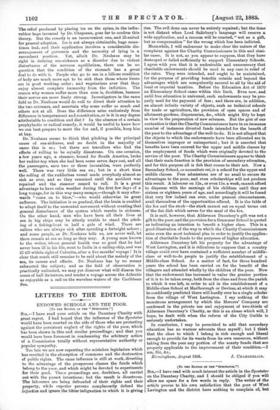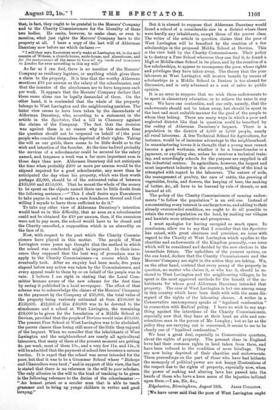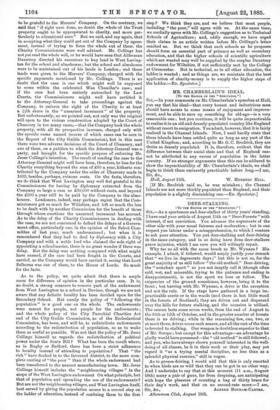[TO THE EDITOR OP THE "SPECTATOR.'
SIR, —I have read with much interest the article in the Spectator on the Dauntsey Charity, and I should be obliged if you will allow me space for a few words in reply. The writer of the article proves to his own satisfaction that the poor of West Lavington and the district have nothing to complain of, but
that, in fact, they ought to be grateful to the Mercers' Company and to the Charity Commissioners for the liberality of these
two bodies. He omits, however, to make clear, or even to mention, what just rights the Mercers' Company have to the
property at all. I have a copy of the last will of Alderman Dauntsey now before me which declares :—
"I will that myn Executors newly make at Lavington wt, in the said *wale of Wiltese, a church-house, stole-house, and almeehotise, and for the contynuance of the same to have all my lands and tenements in London for ever according to this my will."
As far as I can find, there is no mention of the Mercers' Company as residuary legatees, or anything which gives them a claim to the property. It is true that the worthy Alderman mentions £10 per annum as the salary of the schoolmaster, and that the inmates of the almshouses are to have tenpence each per week. It appears that the Mercers' Company declare that these sums alone can be legally demanded of them. On the other hand, it is contended that the whole of the property
belongs to West Lavington and the neighbouring parishes. The latter view seems to have been taken by the descendants of Alderman Danntsey, who, according to a statement in the article in the Spectator, filed a bill in Chancery against the claims of the Company. The fact that the decision was against them is no reason why in this modern time the question should not be reopened on behalf of the poor people who consider themselves deprived of their rights. Taking the will as our guide, there seems to be little doubt as to the wish and intention of the founder. At the time he lived probably the services of a schoolmaster could be secured for the salary named, and. tenpence a week was a far more important sum in those days than now. Alderman Dauntsey did not anticipate the time when probably £200 or more per annum would be the
stipend required for a good schoolmaster, any more than he anticipated the day when his property, which was then worth perhaps £2,000, should be of the estimated value of between £100,000 and £150,000. That he meant the whole of the money to be spent on the objects named there can be little doubt from the following sentence :—" This I shall desire myn Executours to take payne in and to make a sure foundacon thereof and God willing I mynde to leave them sufficient to do it."
To take any other view of Alderman Dauntsey's intention would land us in this difficulty, that as soon as a schoolmaster could not be obtained for £10 per annum, then, if the executors were not to pay more, the school would have to be closed and the Charity cancelled, a supposition which is an absurdity on the face of it.
Now, with respect to the part which the Charity Commis- sioners have played in this matter. The people of ,West Lavington some years ago thought that the method in which the school was conducted might be improved. In their inno- cence they supposed that the best way of procedure was to apply to the Charity Commissioners—a course which they eventually took. After an enquiry had been made, five years elapsed before any action was taken by the Commissioners, and every appeal made to them by or on behalf of the people was in vain. I believe I am right in stating that the Local Com- mittee became aware of the new scheme for the first time by seeing it published in a local newspaper. The effect of that scheme was to acknowledge the claims of the Mercers' Company on the payment by the Company of £30,000, the total value of the property being variously estimated at from £100,000 to £150,000. £12,000 of this £30,000 was to be devoted to the almshouses and a school at West Lavington, the remaining
£18,000 to be given for the foundation of a Middle School at Devizes, provided that the people of Devizes would raise £10,000. The present Free School at West Lavington was to be abolished, the poorer classes thus losing still more of the little they enjoyed
of the bequest. When we consider that the inhabitants of West Lavington and the neighbourhood are nearly all agricultural labourers, that many of them at the present moment are getting fis. per week, most of them 10s., and a very few lls. and 12s., it will be admitted that the payment of school fees becomes a serious burden. It is urged that the school was never intended for the poor, but that it was to be a Grammar School where " Bishops and Chancellors were bred ;" and in support of this view, the fact
is stated that there is no reference in the will to poor scholars. The only allusion in the will to the kind of teaching to be given is the following reference to the duties of the schoolmaster :—
" An honest priest or a aeculer man that is able to teach grammer and to bring up yonge childern in vertue and good lernyng." But it is absurd to suppose that Alderman Danntsey would found a school of a considerable size in a district where there were hardly any inhabitants, except those of the poorer class. The writer of the article in question claims that the poor of West Lavington will be benefited by the creation of a few scholarships in the proposed Middle School at Devizes. This is the view held by the Charity Commissioners. Their policy is to destroy a Free School wherever they can find it, to found a High or Middle-class School in its place, and by the creation of a few scholarships, to appear to recompense the poor, whose right* and privileges they have taken away. The theory that the poor labourers at West Lavington will receive benefit by means of scholarships in a Middle School in Devizes is too absurd for discussion, and is only advanced as a sort of salve to public opinion.
It is an error to suppose that we wish these endowments to be spent in elementary education, or to relieve the rates in any way. We have one contention, and one only, namely, that the endowments should not be taken away, but should be spent in the best and most suitable manner for the good of the people to whom they belong. There are many ways in which a poor and neglected district like that in question could be benefited by the outlay of Alderman Dauntsey's bequest. There is a population in the district of 4,000 or 5,000 people, nearly all rural labourers. A free Technical School for Agriculture, for instance, would be of immense advantage to the neighbourhood. In manufacturing towns it is thought that a young man cannot become a good workman, whether it be a braes-founder or a japanner, or anything else, unless he receives a technical train- ing, and accordingly schools for the purpose are supplied in all the industrial centres. In agriculture, however, the largest and most important industry in the country, nothing of the kind is attempted with regard to the labourers. The nature of soils, the management of poultry, the care of cattle, the growing of vegetables, fruits, and flowers, the keeping of bees, the making of butter, &c., all have to be learned by rule of thumb, or not learned at all.
The policy of the Charity Commissioners of causing endow- ments "to follow the population" is an evil one. Instead of concentrating every interest in our large towns, and adding to their already overcrowded condition, we ought to do all possible to retain the rural population on the land, by making our villages and hamlets more attractive and prosperous.
I must apologise for having occupied so much space. In conclusion, allow me to say that I consider that the Spectator has raised, with great clearness and precision, an issue with regard to the Charity at West Lavington which applies to the charities and endowments of the Kingdom generally,—an issue which will be considered and decided by the new electors in the immediate future. The upholders of the present system, on the one hand, declare that the Charity Commissioners and the Mercers' Company are right in the action they are taking. We, on the other hand, contend that every penny of the property in question, no matter who claims it, or who has it, should be re- stored to West Lavington and the neighbouring villages, to be spent in the most approved methods for the benefit of the in- habitants for whose good Alderman Dauntsey intended that property. The case of West Lavington is but one among many in this country which have been dealt with with the same dis- regard of the rights of the labouring classes. A writer in a Conservative contemporary speaks of "legalised confiscation" in connection with Radical policy. I have no wish to say any- thing against the intentions of the Charity Commissioners, especially now that they have at their head an able and con- scientious man in the person of Mr. Longley ; but so far as the policy they are carrying out is concerned, it seems to me to be clearly one of " legalised confiscation."
We hear a great deal, especially in Conservative quarters, about the rights of property. The peasant class in England have had their common rights in land taken from them, and have been reduced to the condition of mere hirelings. They are now being deprived of their charities and endowments. These proceedings on the part of those who have had hitherto the monopoly of political power are not happy illustrations of the respect due to the rights of property, especially now, when the power of making and altering laws has passed into the hands of those who have a keen sense of the injustice inflicted upon them.—I am, Sir, &c., Edgebaston, Birmingham, August 18th, Jun Commie's.
[We have never said that the poor of West Lavington ought to be grateful to the Mercers' Company. On the contrary, we said that "if right were done, no doubt the whole of the Trust property ought to be appropriated to charity, and more par- ticularly to educational uses." But we said, and say again, that in accepting what they could get out of the Company by agree- ment, instead of trying to force the whole out of them, the Charity Commissioners were well advised. Mr. Collings has not yet read the whole will, or he would have seen that Alderman Dauntsey directed his executors to buy land in West Lexing- ton for the school and almshouse; but the school and almshouse were to be maintained out of his lands in London ; and these lands were given to the Mercers' Company, charged with the specific payments mentioned by Mr. Collings. There is no doubt that the case is one which might well be supposed to come within the celebrated Wax Chandler's case ; and if the case had been entirely untouched by the Law Courts, the Commissioners might well have certified it to the Attorney-General to take proceedings against the Company, to enforce the right of the Charity to at least a frith share in the " unearned increment " of the property. Bat unfortunately, as we pointed out, not only was the original will open to the vicious construction adopted by the Court of Chancery in too many cases,—that the Company took the whole property, with all its prospective increase, charged only with the specific sums named (scores of which cases can be seen in the Report of the City Guilds Commission), but in this case there were two adverse decisions of the Court of Chancery, and one of them, on a petition to which the Attorney-General was a party, and brought for the specific purpose of enforcing Mr. Jesse Collings's intention. The result of sending the case to the Attorney-General might well have been, therefore, to lose for the
Charity everything beyond tbe sum of £60 a year, hitherto con- tributed by the Company under the order of Chancery made in 1633, besides, perhaps, ruinous costs. On the facts, therefore, we do think that West Lavington may well feel grateful to the Commissioners for having by diplomacy extracted from the Company so large a sum as £30,000 without costs, and beyond the £200 a year still to be paid by the Company to the alms- houses. Londoners, indeed, may perhaps regret that the Com- missioners got so much for Wiltshire, and left so much the less to be dealt with by another Commission for the benefit of those through whose exertions the unearned increment has accrued.
As to the delay of the Charity Commissioners in dealing with the case, we are not concerned to defend the delays of a Govern. ment office, particularly one, in the opinion of the Select Com- mittee of last year, much undermanned ; but when it is remembered that they had to deal by diplomacy with a City Company and with a noble lord who claimed the sole right of appointing a schoolmaster, there is no great wonder if there was delay. But the delay was nothing compared with what might have ensued, if the case had been fought in the Courts, and carried, as the Company would have carried it, seeing that Lord Selborne was one of them, to the House of Lords. So much for the facts.
As to the policy, we quite admit that there is ample room for difference of opinion in the particular case. It is, no doubt, a strong measure to remove part of the endowment from West Lavington to a school in Devizes, though we are not aware that any definite locality has been decided upon for the Secondary SchooL But surely the policy of "following the population" is a good one on the whole. The endowments were meant for people, not people for the endowments ; and the whole policy of the City Parochial Charities Act and of the City Guilds Commission, as of the Ecclesiastical Commission, has been, and will be, to redistribute endowments according to the redistribution of population, so as to make them as useful as possible. Was not that the policy of Mr. Jesse Collings himself as regards the redistribution of political power under the Seats Bill ? What has been the result where, as in Rugby or Bedford, there has been a strict adherence to locality instead of attending to population ? That "the rich" have flocked in to the favoured district, to the more com- plete ousting of " the poor " than if the whole endowment had been transferred to the nearest manufacturing town. Mr. Jesse Collings himself includes the "neighbouring villages" in the scope of the West Lavington endowment On what principle, but that of population and spreading the use of the endowments? But are not the neighbouring villages, and West Lavington itself, best served by giving the population access to a second step on the ladder of education, instead of confining them to the first step ? We think they are, and we believe that most people, including "the poor," will agree with us. At the same time, we cordially agree with Mr. Collings's suggestion as to Technical Schools of Agriculture ; and, oddly enough, we have urged their claims in an article written before Mr. Collings's letter reached us. But we think that such schools as he proposes should form an essential part of primary as well as secondary education, and that the higher schools of scientific agriculture which are wanted may well be supplied by the surplus Dauntsey endowment for Wiltshire, if not sufficiently met by the College at Cirencester. But in technical, as in all other education, the ladder is wanted ; and as things are, we maintain that the beet application of charity-money is to supply the higher steps of the ladder.—En. Spectator.]




































 Previous page
Previous page